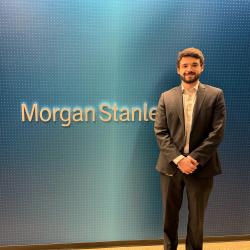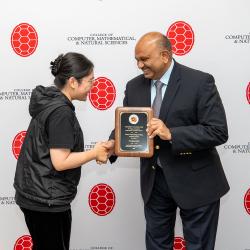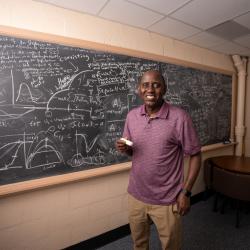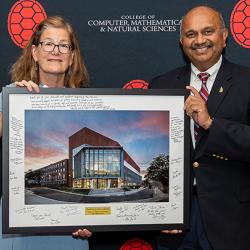Three College Faculty Members Receive Prestigious Simons Fellowships
Jacob Bedrossian, Christopher Jarzynski and Leonid Koralov earned yearlong sabbaticals to focus on research
Three faculty members in the University of Maryland’s College of Computer, Mathematical, and Natural Sciences (CMNS) received 2020 Simons Foundation Fellowships. The prestigious fellowships provide support for faculty scientists to extend a one-term, university-sponsored sabbatical into a full year, allowing them to focus solely on advancing fundamental research in mathematics or theoretical physics. UMD researchers received 2 of the 40 fellowships awarded for mathematics and one of the eight fellowships for theoretical physics.
UMD’s 2020 Simons Fellows are:
- Jacob Bedrossian, Professor, Department of Mathematics and the Center for Scientific Computation and Mathematical Modeling
- Christopher Jarzynski, Distinguished University Professor, Department of Chemistry and Biochemistry, Department of Physics, and the Institute for Physical Science and Technology
- Leonid Koralov, Professor, Department of Mathematics
UMD topped the list with the most 2020 Simons Fellows, tied with the University of Michigan, the University of Illinois at Urbana-Champaign and Stony Brook University. UMD’s 2020 Simons Fellows join six other CMNS faculty members who were named Simons Fellows since 2013.
“We are very pleased to congratulate all three of these very accomplished researchers,” said CMNS Dean Amitabh Varshney. “The awarding of this very competitive fellowship to three of our researchers demonstrates UMD’s strength in fundamental research in both mathematics and physics.”
Bedrossian studies stability and mixing in fluids and plasmas. His major focus is on establishing mathematically rigorous foundations for the theories of turbulence, an important but poorly understood physical phenomenon that plays a crucial role in everything from ocean currents and weather patterns to bridge construction and vehicle fuel efficiency.
Bedrossian achieved early success for breakthrough work demonstrating how mixing helps turbulent systems with distinct vortex shapes maintain their coherent structure. These ubiquitous vortices, seen in tornadoes and hurricanes as well as in water flowing through pipes or cream stirred into coffee, are intriguing because they demonstrate a type of stability within otherwise turbulent systems.
A 2015 Sloan Research Fellow, Bedrossian received a Faculty Early Career Development Award from the National Science Foundation in 2016. He received the 2019 Activity Group on Analysis of Partial Differential Equations Prize (jointly with Nader Masmoudi) from the Society for Industrial and Applied Mathematics and the 2019 IMA Prize from the Institute for Mathematics and its Applications, which recognizes a mathematical scientist who has made a transformative impact on the mathematical sciences and its applications. He will also be the inaugural recipient of the 2020 Lax Award given by the XVIII International Conference on Hyperbolic Problems.
Prior to joining UMD in 2014, Bedrossian was a National Science Foundation Postdoctoral Fellow and Cathleen Morawetz Postdoctoral Fellow at the Courant Institute of Mathematical Sciences at New York University. He earned his B.S. in mathematics and M.S. in applied mathematics from Case Western Reserve University and his Ph.D. in mathematics from the University of California, Los Angeles in 2011.
Bedrossian will spend his sabbatical at the Courant Institute. While working on a variety of projects there, Bedrossian will continue to collaborate with colleagues at UMD. He also expects to travel to England and possibly the U.S. West Coast to work with colleagues.
Jarzynski is a statistical physicist and theoretical chemist who models the random motions of atoms and molecules. Working at the boundary between chemistry and physics, Jarzynski studies how the laws of thermodynamics—originally developed to describe the operation of steam engines—apply to complex microscopic systems such as living cells and artificial nanoscale machines.
Jarzkynski is well known for developing an equation to express the second law of thermodynamics for systems at the molecular scale. The equation is known as the Jarzynski equality, which was noted by the Nobel Committee for Physics as an application of the 2018 prize-winning invention, optical tweezers. This research has led to a new method for measuring “free energy”—the energy available to any system to perform useful work—in extremely small systems.
A Fellow of the American Physical Society (APS) and the American Academy of Arts and Sciences, Jarzynski received the APS 2019 Lars Onsager Prize, which recognizes outstanding research in theoretical statistical physics. He was also awarded a Fulbright Fellowship and the Raymond and Beverly Sackler Prize in the Physical Sciences. He serves on the editorial board for the Journal of Statistical Mechanics: Theory and Experiment and is an associate editor for the Journal of Statistical Physics.
Jarzynksi earned his B.A. in physics from Princeton University and his Ph.D. in physics from the University of California, Berkeley. After a postdoctoral appointment at the Institute for Nuclear Theory in Seattle, he spent 10 years at Los Alamos National Laboratory. He has been on the faculty of the University of Maryland since 2006.
During his sabbatical, Jarzynski will be based at UMD but intends to travel to Europe and California for workshops, visiting professorships and collaborations.
Koralov works in the fields of partial differential equations, probability and random processes. One of the areas of his research is metastability in non-equilibrium systems. Metastability of a system is characterized by long periods of random oscillations near an apparent equilibrium followed by a sudden transition towards another more stable equilibrium. Metastability is exhibited, in particular, in climate change, genetic mutations and molecular dynamics.
Another direction of his research concerns branching and diffusion processes. These processes describe the evolution and spread of a population in which individuals—be they subatomic particles, living cells or entire organisms—come into being, multiply, occupy new spaces and die. Branching and diffusion occur in chemistry, physics, ecology, genetics and many other fields.
Koralov is developing important new mathematical tools to describe and predict the behavior of such processes as the spread of infectious disease, or certain chemical and nuclear reactions.
Koralov is the author of the graduate-level textbook titled “Theory of Probability and Random Processes,” published by Springer. Koralov received a Simons Fellowship in mathematics in 2013-2014.
Prior to joining UMD in 2006, Koralov was an assistant professor at Princeton University and a research fellow at the Institute for Advanced Study. Koralov studied mathematics as an undergraduate student at Moscow State University and earned his Ph.D. in mathematics at the State University of New York, Stony Brook. During his Ph.D. program, he spent a semester at Los Alamos National Laboratory.
Koralov will spend his sabbatical year at UMD and travel to visit collaborators at the University of North Carolina, Carnegie Mellon and Penn State.
###
Writer: Kimbra Cutlip
Media Relations Contact: Abby Robinson, 301-405-5845, abbyr@umd.edu
University of Maryland
College of Computer, Mathematical, and Natural Sciences
2300 Symons Hall
College Park, Md. 20742
www.cmns.umd.edu
@UMDscience
About the College of Computer, Mathematical, and Natural Sciences
The College of Computer, Mathematical, and Natural Sciences at the University of Maryland educates more than 9,000 future scientific leaders in its undergraduate and graduate programs each year. The college's 10 departments and more than a dozen interdisciplinary research centers foster scientific discovery with annual sponsored research funding exceeding $175 million.










